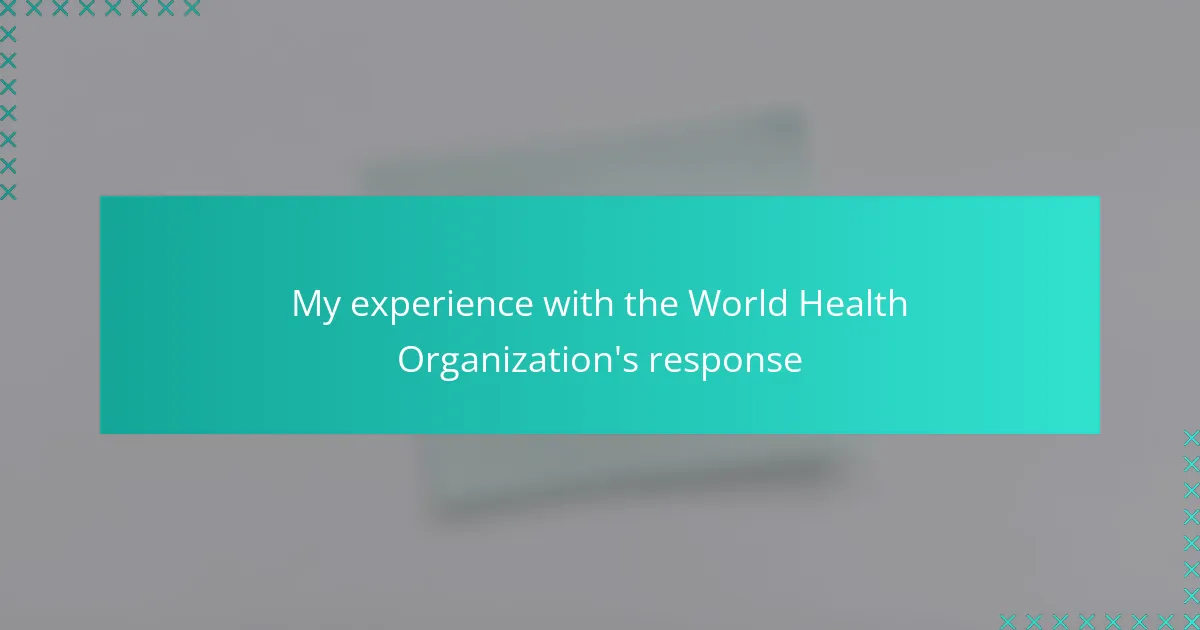Key takeaways
- The World Health Organization (WHO) balances science and political interests, shaping health recommendations amidst diverse national priorities.
- WHO’s effectiveness in global health crises relies on timely information sharing and cooperation from member states, which can be hindered by political tensions.
- Challenges in implementing WHO guidelines include bureaucratic delays and varying resources among countries, impacting response effectiveness.
- Key lessons from engagement with WHO emphasize the importance of patience, adaptability, and the need for building trust among diverse stakeholders in global health diplomacy.
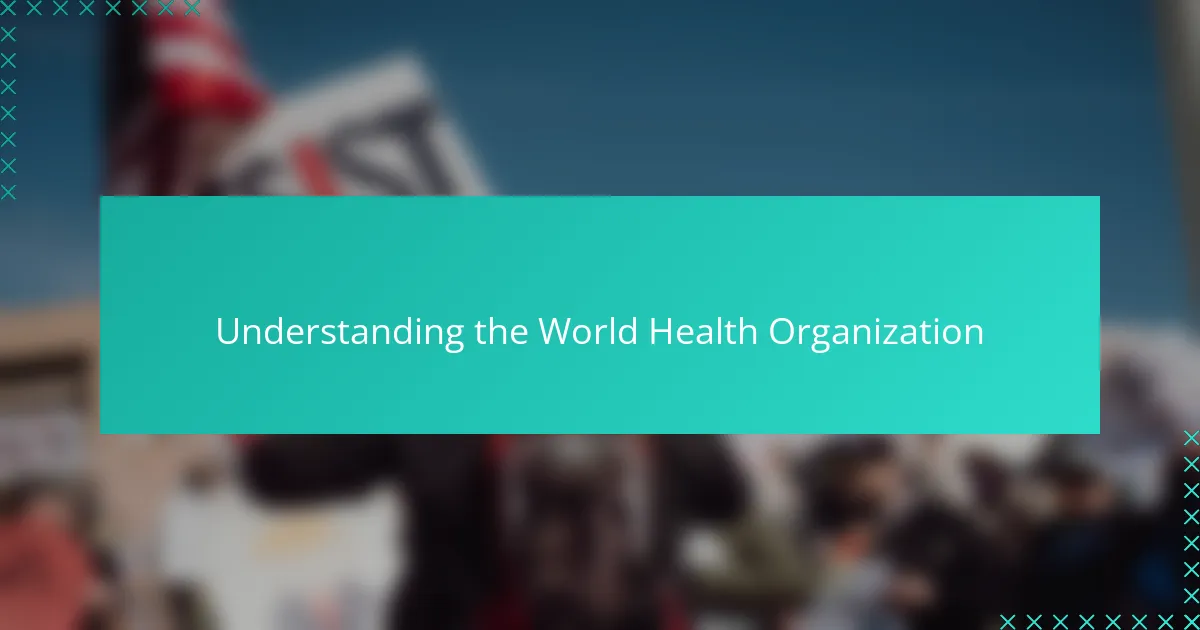
Understanding the World Health Organization
The World Health Organization, or WHO, is more than just an international agency; it’s the global community’s attempt to coordinate health efforts across borders. When I first learned about WHO, I was struck by its complex structure — it’s not a one-size-fits-all operation but a network of regional offices and member states working together. Have you ever wondered how decisions that affect billions of people are made on such a vast scale?
In my experience, understanding WHO’s role means appreciating the delicate balance between politics and science. It’s fascinating, yet challenging, to see how recommendations are shaped not just by data but also by diverse national interests. When I followed their response during health crises, I often felt torn between hope in their guidance and frustration at the limitations they face.
What stands out most to me is WHO’s mission to promote health equity worldwide. But I ask myself: how effective can an organization be when it depends so heavily on cooperation from countries with vastly different priorities? This tension is central to grasping what WHO truly represents in global health governance.
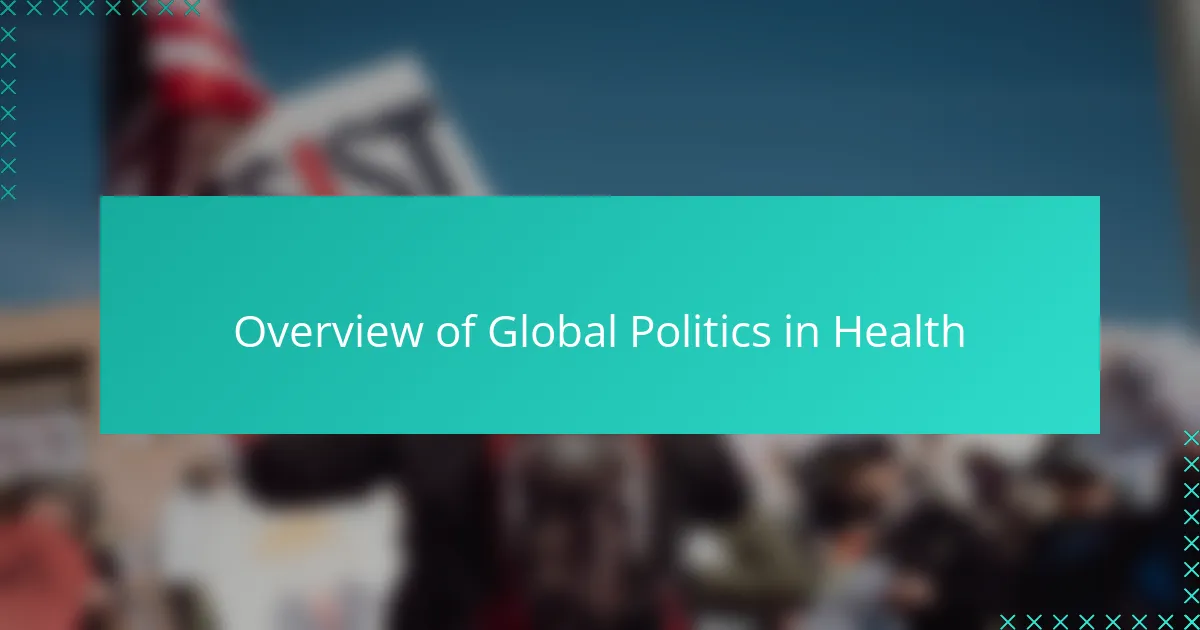
Overview of Global Politics in Health
Global politics in health is a complex web that extends far beyond just medicine and science. From my observations, it’s really about how power, resources, and influence shape who gets access to care and who doesn’t. Have you ever thought about why some health emergencies mobilize rapid international responses, while others seem to slip through the cracks?
Navigating this landscape made me realize how health issues are deeply entangled with national interests and geopolitical strategies. It’s not simply about saving lives; it’s also about safeguarding political alliances, economic stability, and sometimes, even national prestige. This intersection can either strengthen or hinder global cooperation, depending on the prevailing global climate.
What I find most striking is how fragile yet essential international agreements and collaborations are in ensuring collective health security. It’s like walking a tightrope, balancing urgency with diplomacy—a challenge that leaves me both hopeful and cautious about the future of global health governance.
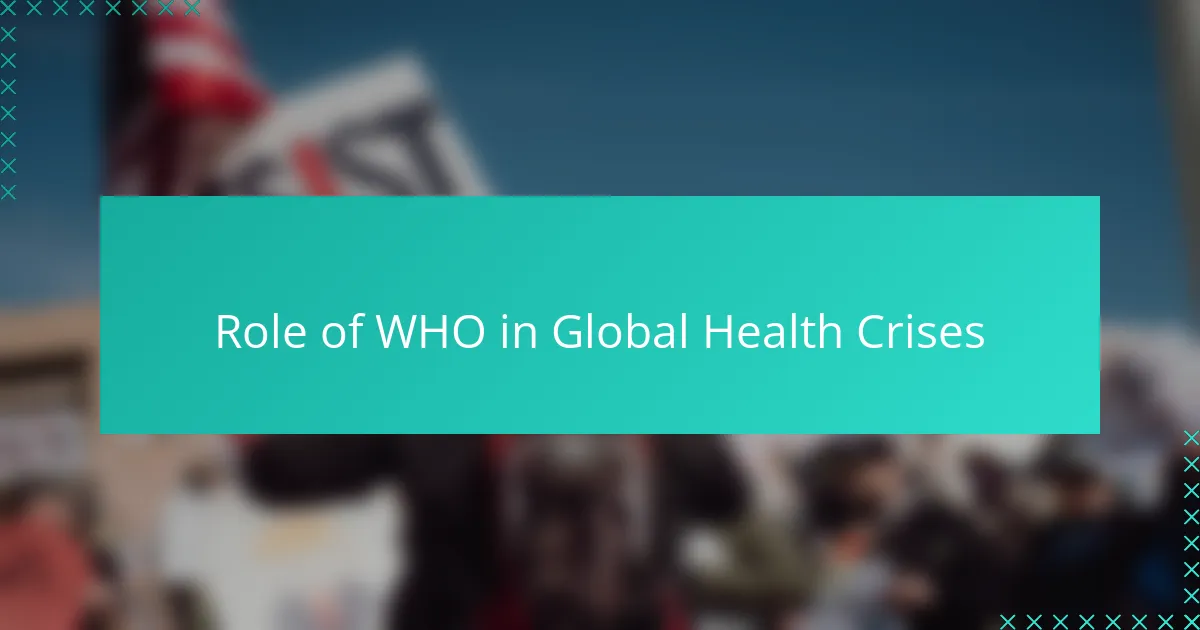
Role of WHO in Global Health Crises
The WHO plays a pivotal role as the world’s health coordinator during crises, stepping in to guide countries with scientific expertise and coordination. I remember watching their efforts closely during outbreaks, and it struck me how crucial timely information sharing is — without it, chaos easily takes over. But this makes me wonder: can such an organization truly act fast enough when every hour counts?
One thing I’ve come to appreciate is WHO’s function as both a technical advisor and a diplomatic mediator. They don’t just provide recommendations; they also navigate the tricky waters of national sovereignty and political tensions to foster cooperation. This balancing act often left me admiring their persistence, even when progress seemed frustratingly slow.
Yet, I’ve also seen that WHO’s influence depends heavily on the willingness of member states to implement its guidance. Watching this dynamic unfold, I often felt a mix of admiration for their global reach and empathy for the tightrope they walk. How do you lead a worldwide response when not everyone agrees on the direction? This question lingered with me throughout their crisis interventions.
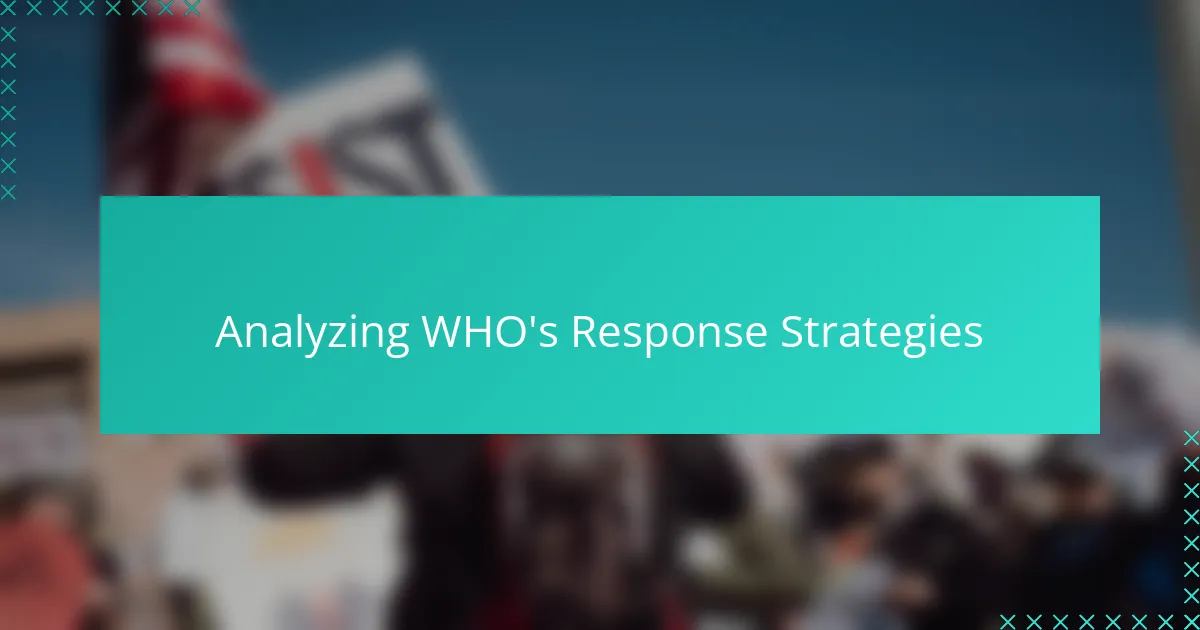
Analyzing WHO’s Response Strategies
When analyzing WHO’s response strategies, I noticed they often rely on a careful blend of data-driven guidance and coalition-building. This approach makes sense given the diverse political landscapes they must navigate, but I sometimes questioned how flexible these strategies really are when rapid adaptation is crucial during emergencies. Have you ever wondered if sticking too closely to protocol could slow down much-needed innovation in crisis response?
From my experience, one strength of WHO’s strategy lies in its emphasis on transparency and global communication. I recall following updates during recent outbreaks and appreciating the effort to keep information flowing, although delays and mixed messages sometimes undermined trust. It made me think: how can WHO enhance real-time communication without alienating member countries sensitive to international scrutiny?
What intrigues me most is how WHO balances its role as a neutral authority with the political realities on the ground. Their strategies often require diplomatic finesse—pushing for unified action while respecting national sovereignty. Observing this delicate dance, I felt both respect for their perseverance and frustration over the compromises that sometimes dilute their recommendations. Is it possible for WHO to maintain influence without becoming entangled in political concessions?
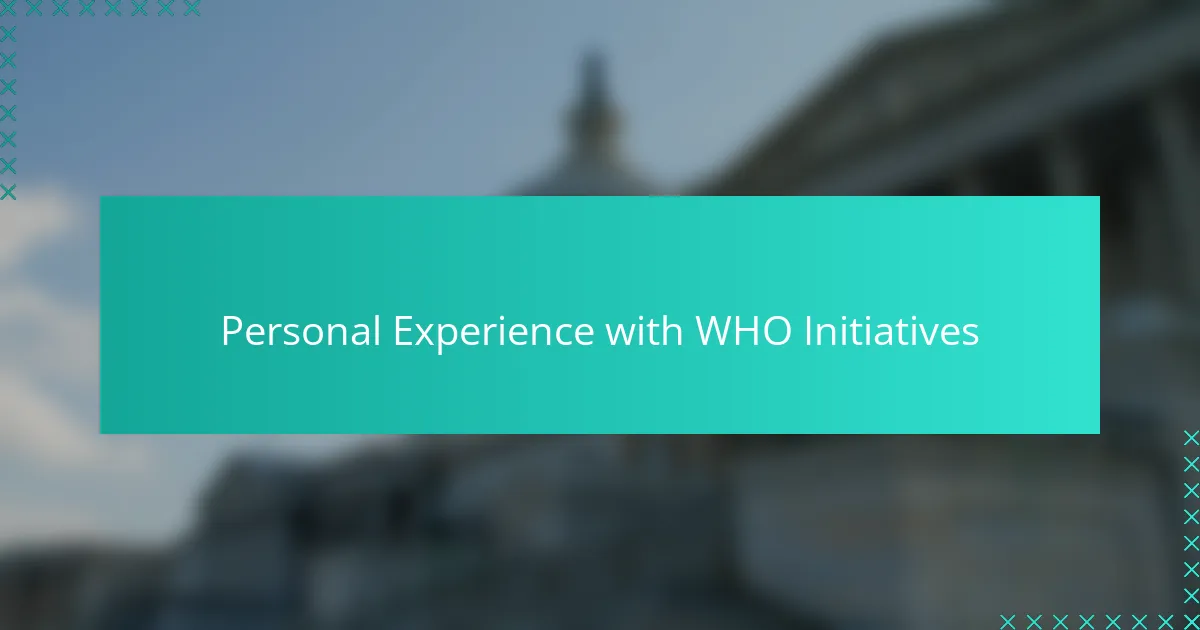
Personal Experience with WHO Initiatives
Engaging directly with WHO initiatives gave me a front-row seat to the challenges of global coordination. I participated in a WHO-supported program on infectious disease surveillance, and what struck me most was the dedication of local health workers trying to implement guidelines amid limited resources. Have you ever witnessed well-intentioned plans collide with real-world constraints? That tension was palpable and often humbling.
One vivid memory I have is from a workshop organized by WHO, where experts from various countries debated protocol adjustments in the face of emerging variants. The passion and urgency in the room made me realize how much is at stake—not just statistics, but lives and livelihoods. It left me wondering how such diverse voices can be harmonized quickly during fast-moving health threats.
Yet, it wasn’t just about the meetings or programs; it was about the subtle ways WHO initiatives influence policy decisions on the ground. I recall conversations with policymakers who credited WHO guidance for shaping their national strategies, despite political pressures to do otherwise. That interplay between global advice and local action fascinated me deeply and still does.
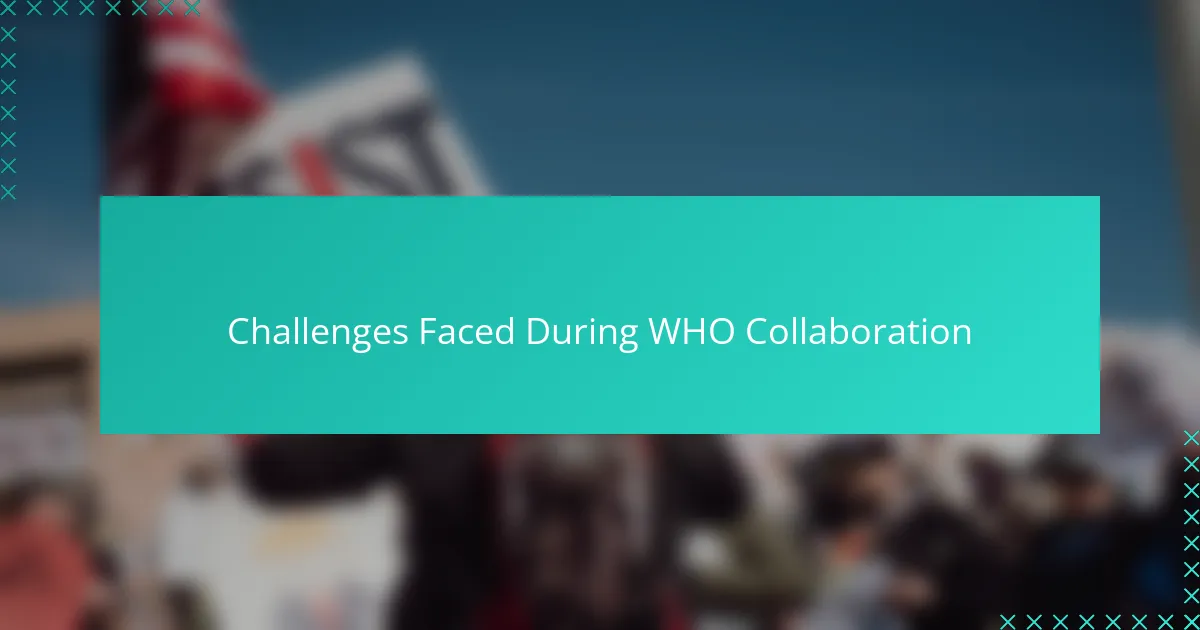
Challenges Faced During WHO Collaboration
Collaboration with WHO, while rewarding, certainly came with its fair share of obstacles. One challenge I frequently noticed was the delicate dance around bureaucratic procedures—sometimes it felt like critical moments slipped away while policies were being reviewed or approvals awaited. Have you ever felt frustrated when red tape slows down what should be urgent action? That’s exactly how I felt witnessing delays that could cost valuable response time.
Another hurdle was navigating the wide array of member states’ priorities. I remember conversations where I sensed underlying tensions—countries hesitant to share full data or reluctant to follow recommendations that clashed with national agendas. This made me think deeply about how political interests sometimes overshadow collective health goals, making consensus a slow and fragile process. How do you push for cooperation when trust isn’t always mutual?
On a more personal note, I often wrestled with the uneven resources and capacities across regions. Seeing local teams struggle to implement WHO guidance without enough manpower or infrastructure was a sobering reminder that global policies don’t always translate easily on the ground. It raised the question for me: how can an organization as ambitious as WHO bridge such glaring inequalities and support those at the farthest margins effectively?
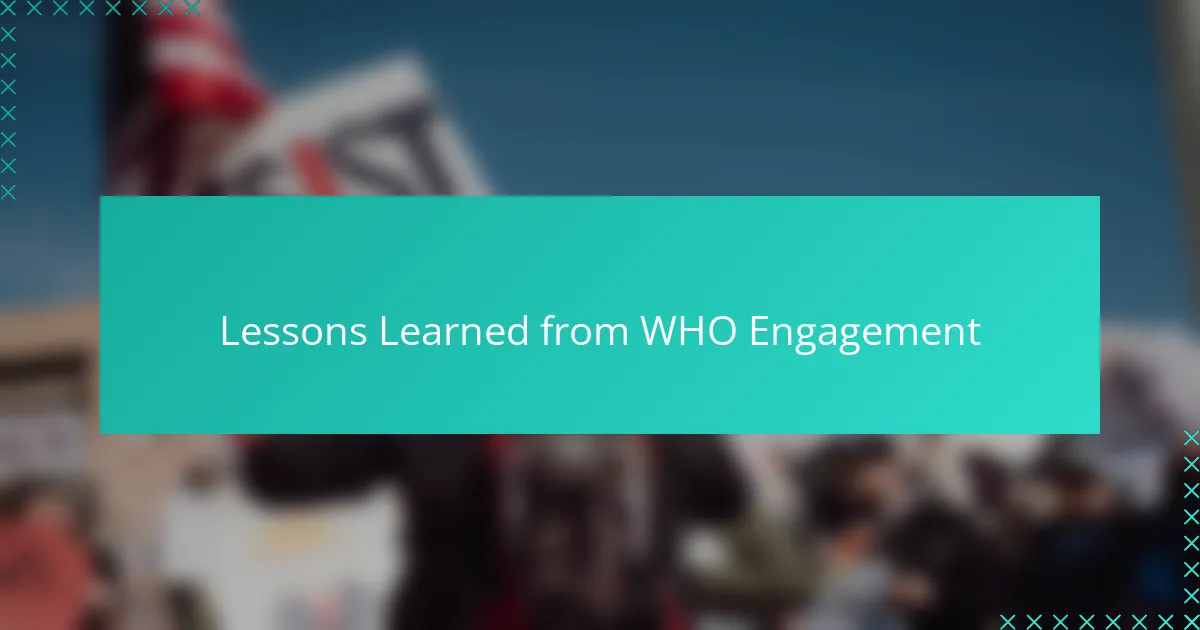
Lessons Learned from WHO Engagement
Reflecting on my engagement with WHO, one clear lesson was the importance of patience and persistence in global health diplomacy. I learned that meaningful change rarely happens overnight; it requires building trust slowly among diverse stakeholders, each with their own agendas and concerns. Have you ever tried to unite people who don’t always see eye to eye? That’s the daily reality WHO navigates.
I also realized how crucial adaptability is when working with such a complex organization. In one instance, a recommended protocol had to be adjusted rapidly due to local constraints I observed firsthand. It taught me that flexibility isn’t just a bonus but a necessity for WHO initiatives to succeed on the ground.
Perhaps most strikingly, I came to appreciate the humility needed to collaborate with WHO. Despite their global mandate, they depend profoundly on the willingness and cooperation of member states and local actors. This made me wonder: how can any organization maintain authority while continually negotiating with so many different voices? It’s a delicate but vital balancing act that defined much of my experience.
